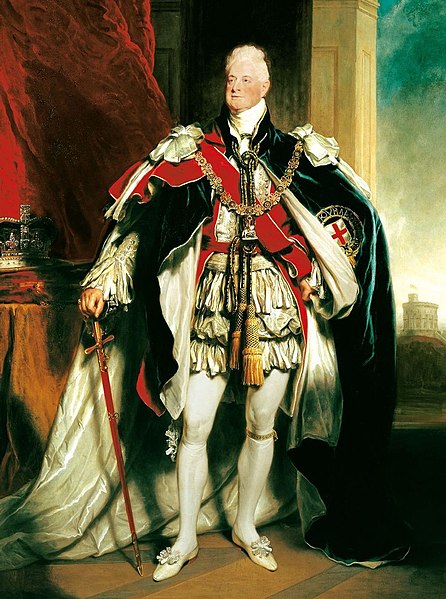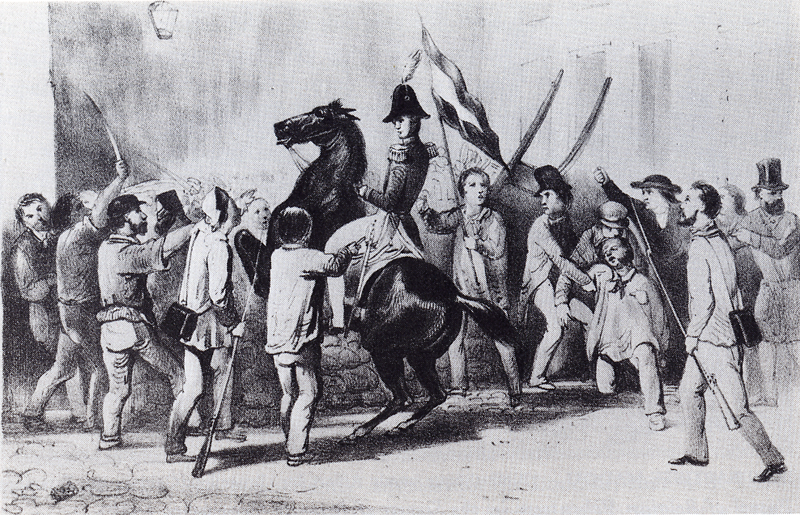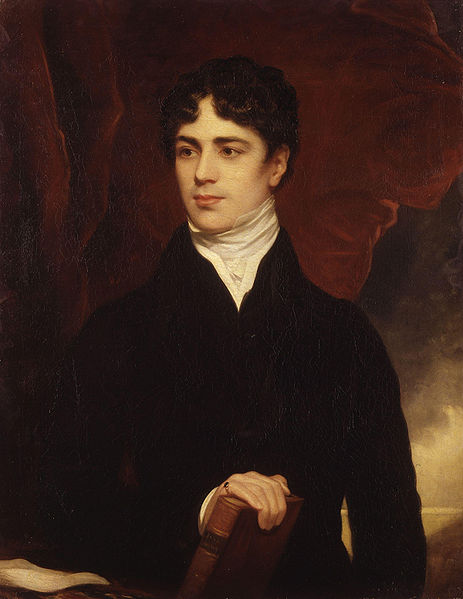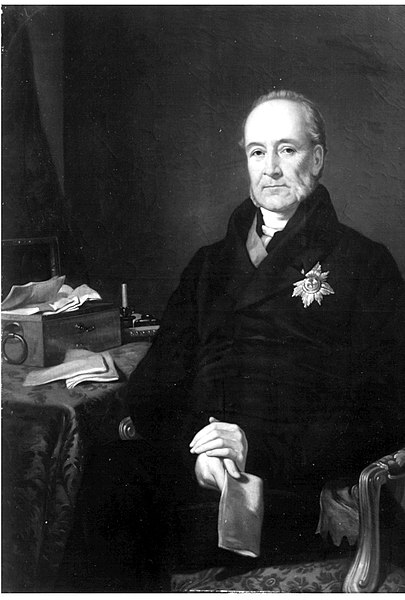 |
| William IV |
Interference
Rumblings from the British government about Lieven
interference meant another visit from Matuscewitz in May and Christopher was once
again recalled to Russia. Dorothea accompanied him to Warsaw, from whence Christopher
hoped to visit Courland. In a trip that took a mere 55 hours, Dorothea hurried
back to London where much had changed in her absence.
The death of George IV, on 26th June 1830, and
his replacement by his brother William did not result in a change of ministry.
Dorothea would have to work with Wellington as Prime Minister for the
foreseeable future.
While Dorothea was away Wellington visited the children in his
role of godfather to Arthur. On the strength of that Dorothea now invited him
to visit. She wrote to Alexander;
‘The
Duke of Wellington came to see me yesterday, and we ended by saying quite
tender things to each other, and you may rest assured that we are once more on
an excellent footing.’[i]
 |
| Panshanger |
In July Christopher fell seriously ill in a small Polish
village en route to St Petersburg, and Dorothea feared for his life. At home
Dorothea’s carriage was overturned and her back was strained.
‘’I
have been terribly upset by the accident from which my husband so narrowly
escaped. Thank God, he is now all right again, and I have only a strained
back.’[ii]
In August Dorothea was having problems walking and in
September was visiting Lady Cowper at Panshanger before trying sea bathing at Brighton, a
self-help method proclaimed as efficacious for all ills. Dorothea was still
having trouble walking in October.
Revolutions Abound
 |
| Louis Philippe |
The 1830
revolution in Paris in July[iii] meant that the arbitrary
Charles X was
replaced by his cousin, Louis-Philippe[iv] who styled himself King
of the French rather than King of France. The possibility of revolution in
Europe was unwelcome to the Czar and his ministers and Dorothea was concerned
about Grey’s liberal views.
Talleyrand arrived in London as the new ambassador; following
Aberdeen’s advice Wellington recognised the new government. Dorothea wrote;
‘The
Duke of Wellington, who is never wanting in tact and perception when his own
security is at stake, very promptly realised that he must recognise “la Nouvelle France” or resign. He chose
the former course at an opportune moment.’[v]
Encouraged by the French success, the Belgians demanded
separation from rule from den Haag
[vi]. The Dutch king William I,
sent in the troops whom the Belgians promptly defeated and
proclaimed independence from the Netherlands. All this revolutionary success
abroad unsettled the mood in England.
Dorothea believed that diluting Wellington’s cabinet with
politicians like Lord
Melbourne[vii]
and her friends Palmerston and Grey would bring about a pro-Russian, and at the
same time an anti-revolutionary, cabinet.
Palmerston was not prepared to work with Wellington without
the support of like minds and Wellington was not a political genius. His
government lost the vote on 15th November and Grey was asked to form
an administration.
Paul Lieven was posted to Paris and Dorothea was able to see
him when Paul was sent as a special messenger to London in September. Dorothea
wrote to her brother to ask Nesselrode to grant Alexander some leave; her son
was serving in the Foreign Service in Madrid and Dorothea was concerned about
the effect of the climate there on Alexander’s health. Her letter to her
brother once again included a request for information about Constantine who was
a poor correspondent at best and a continual concern to his parents.
A Liberal Government
Dorothea had long cultivated Grey and her greatest friend
Emily Cowper, was Palmerston’s lover and Melbourne’s sister. Christopher did
not return from Russia until November by which time Grey was in power and Dorothea
ensconced as Grey’s discreet adviser along with Emily Cowper.
It was Dorothea who suggested that Palmerston be given the
post of Foreign Secretary.
‘Lord
Palmerston tells me everything, and it is I who listen, and by these little
methods I am well enough placed to serve your master’[viii]
.jpg) |
| Grand Duke Constantine |
Dorothea informed St Petersburg of the news; with
Christopher still absent in Russia it was down to her to collect the
information required by the Czar and Nesselrode. Czar Nicholas was not pleased
by the winds of change that had brought Dorothea’s friends into power. Grey’s
views on parliamentary reforms were ‘detestable’
in Nicholas’ eyes. At the end of November the Poles revolted against
Russian rule and Grand
Duke Constantine[ix]
fled the scene on the 30th.
The revolt meant that the Russian government was focussed
solely on its own domains much to the relief of other European governments.
Constantine was with the Russian forces and Dorothea could still get no
information on what her son was doing. London was focussed on its own internal
dissension; there had been troubles in the provinces and by early November the
troubles reached London.
Neighbours Fall Out
 |
| The Prince of Orange pressed by the crowds during the 1830 uprisings |
In December1830 the great powers decided to recognise
Belgium and the Prince of
Orange was top of the list when it came to deciding who would take the
throne. In the event it was decided, in June 1831, that Leopold be given the
throne. but two months later, a sore loser and supported by the Russians, King William
sent the troops in again. French troops went in, in support of the Belgians and
stayed when the Dutch troops went back home. Talleyrand’s reputation was not of
the best and his interference in the affair of Belgium and the French troops in
there raised fears of fresh French hegemony in Europe.
By September 1831 the Russians had crushed the Polish
rebellion but their methods appalled the British liberals. Dorothea wrote to
Alexander;
‘Not
withstanding the indiscreet words he [Grey] may have uttered before becoming
Prime Minister….[he had] been the most pronounced enemy of revolutions,
revolutionists and of disturbance in general wherever it shows itself.’[x]
This may very well have been wishful thinking on Dorothea’s
part. She was not quite the astute observer that she believed herself.
Dorothea and Christopher were still out of touch with
Constantine; his wild behaviour had worried his parents for some time now and
Dorothea wrote to her brother;
‘I
am still full of anxiety about Constantine. Where is he? Who is his chief? Can
you recommend him to the care of the latter? Can you get reports of his
conduct, which if good, may be passed on to my husband? Do keep an eye on him
now and in the future. All this, dear Alexander, lies very close to a mother’s
heart.’[xi]
Friends Fall Out
 |
| Prince Adam Czartoryski |
When Prince Adam
Czartoryski[xii]
fled from the Russian repression to England Grey received his old friend.
Czartoryski was invited to dine with members of the British cabinet; Dorothea
was outraged and informed Grey so in no uncertain terms. On 4th
January 1832 Grey received Christopher’s formal protest about the meetings with
an enemy of an ally. Grey objected to foreign interference in the matter of whom
he chose to invite to dinner, saying to Palmerston;
‘It
really is too much for a Foreign Minister to interfere with respect to the
private society which any member of the government to which he is accredited,
may think fit to cultivate.’[xiii]
By the end of 1831 Grey and Palmerston had come to realise
that the impasse in the negotiations over Belgium was being aggravated by the
Russian support of the Dutch. Over the Christmas break, staying at a house he
had purchased in East Sheen[xiv], Grey intimated to Dorothea
that King William’s intransigence was beginning to grate.
Grey additionally ordered Heytesbury to impress Nicholas and
his advisers with British dissatisfaction with events in Poland. This was not
received well[xv],
the dinner incident also grated, Czartoryski had been an adviser to Czar
Alexander and the empress’ lover.
The demolition of certain of Belgium’s border fortresses was
also in question and Palmerston was decidedly against the French having any
input into the decision. The Czar was not pleased with certain parts of the
agreement and was furious that Christopher had signed up to it. Palmerston told
Heytesbury to inform the Czar that Britain would go ahead without Russia and
agree the treaty if they had not heard from St Petersburg by the end of January.
The Canning Affair
The British ambassador in Russia, Heytesbury, was insisting
on returning home, he had been in Russia too long and had been asking to be
recalled for some time. Grey planned to send his son-in-law the Earl of
Durham[xvi].
Radical Jack Lambton fancied himself
as a champion of the people, hardly appropriate to send to autocratic Russia.
But Dorothea recommended to Nesselrode that Durham be fêted.
 |
| Radical Jack Lambton |
The Russians followed her advice and Durham was flattered
and returned in October 1832 advocating working with the Russians rather than
the reactionary French. Palmerston commented;
‘Durham
was thoroughly bamboozled by the Emperor and Nesselrode.’[xvii]
In Durham’s place Palmerston now insisted on sending Stratford
Canning[xviii]
to Russia as ambassador. Dorothea advised against sending him, as the Czar was
unlikely to receive him. Durham too was incensed, seeing it as a personal
insult; he’d advised his father-in-law against Canning’s nomination.
But Grey and Palmerston were fed up with Russian
intransigence in world affairs and the Lievens’ interference in British
politics. Dorothea had advised that Nicholas refuse to meet Canning. The
British were incensed with the idea that a foreign monarch could influence
their choice of ambassador and both sides became entrenched.
Bibliography
Melbourne – David Cecil, The Reprint Society Ltd 1955
The Princess and the Politicians – John Charmley, Penguin
Books 2006
Talleyrand – Duff Cooper, Cassell Biographies 1987
Wellington – Christopher Hibbert, Harper Collins 1997
Paris Between Empires – Philip Mansel, Phoenix Press
Paperback 2003
The Life and Times of George IV – Alan Palmer, Book Club
Associates 1972
Sailor King – Tom Pocock, Sinclair Stevenson 1991
Princess Lieven’s Letters – Lionel G Robinson (ed),
Longmans, Green & Co 1902
The Russian Empire – Hugh Seton-Watson, Oxford University
Press 1988
Arch Intriguer – Priscilla Zamoyska, Heinemann Ltd 1957
Melbourne – Philip Ziegler, Fontana 1978
[i]
Arch Intriguer - Zamoyska
[ii]
Princess Lieven’s Letters - Robinson
[iii]
Also known as the July revolution, a reaction against the policies pursued by
Charles X
[iv]
Leader of the Orléanist party; he abdicated in 1848 and lived in exile in
England
[v]
Arch Intriguer - Zamoyska
[vi]
Linked together by the Treaty of Vienna
[vii]
He was to be the mentor of the future Queen Victoria
[viii]
Arch Intriguer - Zamoyska
[ix]
Appointed by his brother to rule Poland
[x]
The Princess and the Politicians - Charmley
[xi]
Arch Intriguer - Zamoyska
[xii]
Head of the Polish national government and outlawed by the Russians
[xiii]
The Princess and the Politicians - Charmley
[xiv]
Near to where the Lievens lived in Richmond, Palmerston had an estate at Temple
Grove also in East Sheen
[xv]
The Czar had turned to new advisers and the harshness used in crushing the
rebellion was assumed by Heytesbury to be the first fruits of this
collaboration between the two. In their turn the Russians were not impressed at
being criticised by a country that had used brute force to repress Ireland
[xvi]
A thorn in Grey’s side
[xvii]
The Princess and the Politicians – Charmley
[xviii]
Formerly ambassador to the Ottoman Empire


No comments:
Post a Comment
Note: only a member of this blog may post a comment.